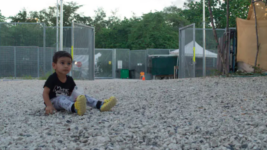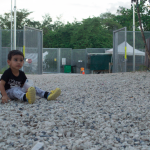UN Finds Australia Is Responsible and Owes Compensation for Rights Violations on Nauru

The United Nations Human Rights Committee (CCPR) has determined that in transferring 24 unaccompanied minors from the Global South, who were seeking asylum, to offshore detention in Nauru in 2014 was definitely in breach of the rights contained in the International Covenant on Civil and Politics Rights (ICCPR), and in particular, the right against arbitrary detention in article 9.
This assessment by the UN experts was published on 9 January, alongside a second determination that related to the case of an Iranian woman.
The findings should come as no surprise, as despite our government’s protestations about not being responsible for the souls it dumps in other less affluent countries, the CCPR found that our nation continues to exercise jurisdiction over those it condemns to offshore detention.
In both cases, the CCPR found that no justification was provided by this nation to explain why the 24 kids and the Iranian woman were being indefinitely detained and were further not permitted to be held in the immigration detention centres on the Australian mainland, especially as the overwhelming majority of these people were determined to be refugees early on.
“A state party cannot escape its human rights responsibility when outsourcing asylum processing to another state,” said CCPR member Mahjoub El Haiba in a 9 January press release. And he added that, “where a state exercises effective control over an area, its obligations under international law remain firmly in place and cannot be transferred”.
The UN body has further ordered that Australia provide “adequate compensation” to all 25 asylum seekers that it dumped on Nauru, along with hundreds more refugees, and it further suggested that the government reform its migration law, following recent Labor amendments, which served to make the state immune from having to pay harmed refugees damages.
Running roughshod over rights
“The UN acknowledges that financial compensation deters governments from inflicting abuse and neglect upon refugees in detention, including here in Australia, with recognition that the immigration detention centres on Nauru are within Australia’s jurisdiction,” said National Justice Project chief executive George Newhouse.
“The National Justice Project has been battling the federal government for more than six years on behalf of children and families stranded on Nauru like garbage by successive governments,” the adjunct professor added in a statement he made on the day following the decision publications.
In the determination regarding the kids our nation detained offshore, the UN experts set out that they were being held in conditions that included “insufficient water and sanitation”, while these children suffered both mental and physical health conditions, including self-harm, depression, kidney problems, insomnia, headaches, weight loss and poor concentration.
The subject of the second complaint, the Iranian woman, as well as 23 of the 24 kids, were all granted refugee status but continued to be held on the island for a period regardless. And the adult Iranian refugee further told the CCPR that she’s been suffering psychological and physical issues ever since her detention on Nauru.
“Late last year the Federal Court issued judgments approving two settlements for two children whose health had been compromised whilst they were detained offshore” said Newhouse, adding that the NJP still has “40 more active cases before the court to try to secure justice for… clients and deter the government from inflicting abuse and neglect on refugees in detention”.

Legislating away any need for compensation
Newhouse told Sydney Criminal Lawyers this week that the CCPR found that Australia has breached article 9 of the ICCPR, as it arbitrarily detained these people fleeing persecution in their homelands, and in depriving the 24 kids and one adult of their liberty, they further denied their right to go before a court to allow a judicial officer to decide upon whether their detention was justified.
The lawyer, who’s long been representing asylum seekers and refugees against the government in the courts, pointed out that article 2 of the CCPR maintains that state parties, of which Australia is, must provide reparations for individuals whose rights within the covenant have been violated.
The CCPR further found that Australia is obligated to provide adequate compensation to these individuals for the harms caused to them both on Christmas Island and at the Regional Processing Centre in Nauru.
However, as Newhouse further outlined, the Albanese government has recently absolved itself and the Coalition from having to right wrongs committed against refugees and asylum seekers going into the future.
In passing the Migration Amendment Bill 2024 last November, the Albanese government inserted subsections 198AD(11A) and 198AD(11B) into the Migration Act 1958 (Cth), which serve to ensure that the minister and Commonwealth incur no civil liability for sending people offshore, and neither do they or any of their officers incur any civil liability in respect of what goes on at offshore sites.
The CCPR acknowledges that the nation has thrown this legislative spanner in the justice works, as it calls upon Australia to “review and modify its migration legislation and policies”, so that it can honour the committee’s findings, whilst Newhouse underscores that these new laws are in direct violation of the ICCPR.
In terms of whether federal Labor had its sights on these cases when enacting the measures that block civil liability cases, the National Justice Project CEO said he doesn’t think that’s the case, but rather he considers the new laws have a lot to do with a series of “strategic cases that NJP ran to get court orders to transfer sick detainees from Nauru… for treatment between 2016 and 2018”.
“In my opinion, the government wants to ensure that it and their officers cannot be held accountable for the harms they cause to asylum seekers on Nauru or elsewhere offshore,” the lawyer continued, “and that their decisions cannot ever be reviewed by Australian courts.”
“I am sure that we will be challenging the legality of these amendments at some point.”
A rogue government in power
Despite the Albanese government having announced that the last refugee had flown out of Nauru in June 2023, as these UN determinations were published last week, there is now 100 asylum seekers detained at the Nauru processing centre.
The CCPR has given Australia 180 days to provide it with advice on how it is giving effect to its orders in terms of providing compensation, ensuring that the nation does not perpetrate similar behaviour towards future asylum seekers, as well as amending the laws so that people in immigration detention who are subjected to having their rights denied, can then at least be compensated in the future.
Yet, on receiving a 2023 CCPR finding that related to the Wunna Nyiyaparli people’s rights being denied when being blocked from arguing their heritage and native title rights in the courts, the government failed to meet its 180 day deadline to respond, and when it did finally come to the table, attorney general Mark Dreyfus told the committee it was wrong.
“The UN has reaffirmed that the government not only has a duty of care for these children and families but that successive governments have been in serious breach of international conventions and treaties,” Newhouse further made clear.
“Far from taking the UN concerns seriously, the current government has attempted to close the door to all future claims by amendments to the Migration Act which provide the government, its agencies and officers with a blanket indemnity to do what harm they want to these vulnerable people,” the lawyer said in conclusion.







